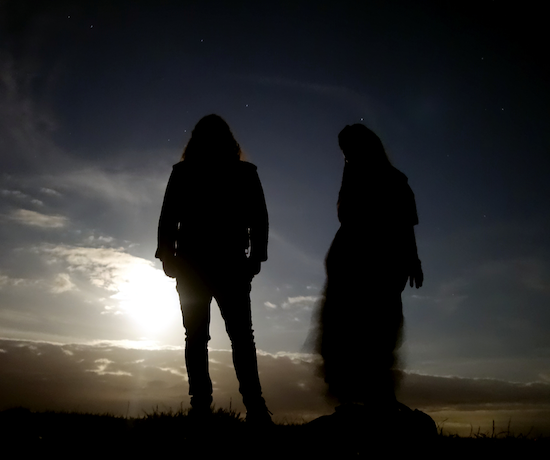Photo by Luke Devlin
Hawthonn have tapped into the arcane history of this blighted isle. Their meditations on landscape, tradition, superstition and the environment unfold like dreams, but for all their unsettling vagueness they seem nevertheless charged with healing properties. Their new album, Earth Mirror, is a partial salve for the effects of events that we, individually, are powerless to effectively prevent or counter.
While previous releases might have proven too prickly at the edges for casual investigators, Earth Mirror could almost serve as a primer of sorts for the curious: graspable despite its wispy, inchoate nature and unhurriedly complete for all its lean forty-five-minute run time. The breadth and depth of the thinking behind the music is complex and learned without being browbeatingly so: you don’t need to be able to decipher John Dee’s language of the angels, nor have completed a PhD into the joyful pessimism of Romanian philosopher Emil Cioran for it to enrich you. Layla and Phil Legard have done all the heavy lifting for us, be it trudging overgrown pathways to record in deserted chapels or poring over the self-published grimoires of modern-day magicians.
Sonically, we are talking earthy, rural ambience through which runs a silver vein of folklore and the occult. Field recordings, electric piano, cello, and a variety of manipulated sounds melt and cohere, with Layla Legard’s spectral voice serving as the one reliable constant. It is by turns wistfully beatific and achingly mournful, but always with an undercurrent of darkness – as though a malformed demon skull could be tilled up from the rich, loamy, life-giving soil at any moment.
Opening track ‘Drowned Light’ begins by fussing at the edges of perception with nape-bothering drones before opening up into an expanse of opalescent organ swells and wet sounds that seem part-way between stalactital trickles and the heavy splash of boggart-curdled milk being squeezed from teat to cold metal bucket. The song closes with two minutes of gradually slumping abstractions before making space for the unnerving ‘Dream Cairn’, a song that builds from minimalistic creaking-timbers cello and blossoms into a glowering concoction of sinister, shrieking whooshes and jaw harp twang.
‘Cat’s Cradle’ is as fine and delicate a structure as its name would suggest, a light-dappled web of scurrying sounds, unfurling electric piano motifs and keening vocals that bleed sweetly out into nothingness. Follow-on ‘Circles Of Light’ initially feels like its counterpart thanks to its steady drone and wordless, hymnal vocals, only for a hint of lilting folksong to spark buried, atavistic memories and a clear, direct piano riff to anchor proceedings in the here and now. Amid these mist-swathed islets drift ‘Odo Galse’ and album closer ‘Vehiel’: tracks that are even more abstract and abstruse – vague, ghostly, unnerving things suggestive of spiderwebs heavy with dew, broken circles of salt, sage smoke carried on the breeze and the tempting call of dark, near-human shapes that swim out in deep, fickle waters.
While Coil might serve as Hawthonn’s spiritual locus and Nurse With Wound a frequent comparison, the sound they’ve reached on Earth Mirror sees them seep stylistically outward. And while there’s no denying that this is an esoteric and decidedly uncommercial release, it’s one that has the power to draw fans of other experimental genres into its puzzling orbit. Occasionally, for instance, you get the sense that the album could serve as a dark, disintegrating inversion of the bucolic cheer to be found within Virginia Astley’s From Gardens Where We Feel Secure. At others you get a hint of how Labradford’s quiet sorrows might have sounded if they were transplanted to some chilly British moor and force-fed a lifetime’s worth of folkloric weirdness. Sometimes, the strongest links seem to be those occupying the further-flung fringes of modern heaviness.
It’s not so much that hauntings and conjurations speak to heavy metal’s time-honoured aesthetic, nor the fact that if the drones were cranked up or certain piano lines transposed for guitar and distorted beyond reason you’d have the makings of something distinctly Sabbathantine. Instead, it’s psychic links that are more subtle: Anna von Hausswolff’s instrumental All Thoughts Fly comes to mind, as do Dylan Carlson’s anglophilic excursions, the magic-with-a-k ritualism of Atriarch and The Body’s recent collaboration with Big Brave. Similarly, the collision of atavism with modernity, and the compulsion to preserve or resurrect Old Ways speaks to both Wardruna’s historically-accurate endeavours and the modern avant-pop of Lindy-Fay Hella. While occasionally sonic, these commonalities lie more in the swirling mix of ancient tradition and modern unease; the quest to find a sense of place amid globalised placelessness and attempts to use what went before to explain – or at least keep at bay – deep instinctual fears that gnaw relentlessly at our overstimulated brains.
Hawthonn make all of this seem effortless. That the album is named for a magical scrying device used to uncover treasures or secrets feels, of course, apt. Thankfully, though, we don’t need access to such hidden knowledge to experience it. After all, for all the manifold ills that modernity might have wrought, we can at least have this curious, beautiful piece of work piped straight from the ether to our headphones. For all its arcana, Earth Mirror’s experiments remain very much part of the present.


